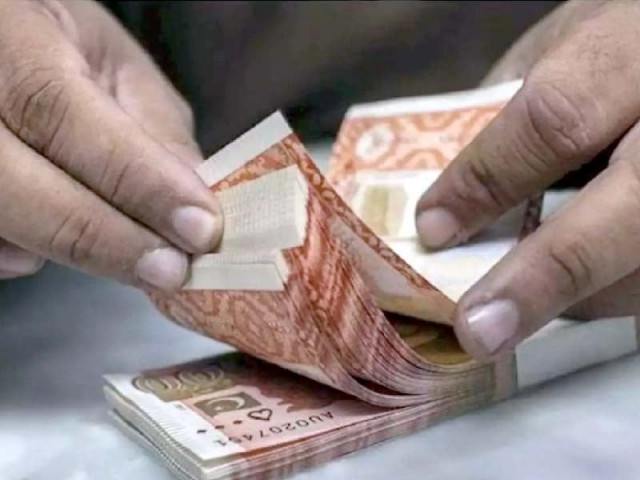Business
RDA inflows rise by $205m to $11.3b | The Express Tribune

SBP raises Rs493b in T-bills auction drawing heavy participation; gold softens; rupee firm
KARACHI:
Pakistan received gross inflows of $205 million under the Roshan Digital Account (RDA) scheme in October 2025, taking the cumulative funds received since its launch in September 2020 to a robust $11.313 billion, according to latest statistics from the State Bank of Pakistan (SBP).
The investment of $205 million in October marked an improvement compared to the six-month average of $189 million and the long-term average of $182 million since the programme’s launch, according to Topline Research. Meanwhile, net inflows – representing gross inflows minus repatriated funds – stood at $180 million during the month, also higher than the six-month average of $165 million and the overall average of $152 million since inception, reflecting sustained confidence of overseas Pakistanis in the scheme.
Furthermore, the SBP conducted a Treasury Bill (T-bill) auction, raising Rs493 billion against the target of Rs550 billion, which indicated robust investor appetite despite a slight shortfall in acceptance. Bids totalled Rs1,562 billion across different tenures, underscoring sustained liquidity in the market.
In the three-month segment, the auction drew Rs347 billion in bids against a Rs150 billion target, with Rs318 billion accepted at a cut-off yield of 11.04% – marginally lower than the secondary market’s close at 11.05% in the previous session. One-month bills mirrored a similar trend, where Rs112 billion was accepted out of total bids of Rs791 billion at 10.99%, a one-basis-point dip from last week’s levels. However, the six-month paper saw lighter acceptance, with only Rs15 billion raised from bids of Rs357 billion at 11.05%, flat when compared with secondary market yields.
Weighted average yields held steady across the board – 10.97% for one-month, 11.02% for three- and six-month tenors, and an overall auction average of 11.32%.
In a parallel auction, the 10-year Pakistan Investment Bonds (PIB) Floating Rate Semi-Annual (PFL-SA) notes attracted Rs728 billion in bids against a Rs500 billion target, but only Rs55 billion was accepted at a cut-off price of 95.1, implying an effective rate of 11.75%. This represented a modest tightening of two basis points from the prior session’s 11.77%, with spreads over the benchmark narrowing to 0.85% from 0.87%.
Separately, the SBP held a buyback auction of five- and 10-year PFL bonds to manage secondary market liquidity, accepting bids worth Rs122.1 billion at cut-off prices ranging between 98.76 and 100.48, and covering maturities between September 2028 and April 2029.
The Pakistani rupee inched up against the US dollar in the inter-bank market on Wednesday, closing at 280.77, an appreciation of one paisa compared with the previous day’s rate of 280.78. Meanwhile, gold prices in Pakistan edged lower, despite a slight rise in the international market, where the yellow metal gained ahead of a US House of Representatives vote to reopen the government, a move that could restart the flow of key economic data and pave the way for a possible Federal Reserve rate cut in December.
According to data released by the All-Pakistan Gems and Jewellers Sarafa Association (APGJSA), the price of gold fell by Rs1,000 per tola, bringing it down to Rs434,762, while the 10-gram rate dropped by Rs857 to Rs372,738. In contrast, silver prices increased by Rs81, reaching Rs5,434 per tola.
Commenting on international price movements, Adnan Agar, Director at Interactive Commodities, noted that gold had broken its upper resistance level. “Gold has moved to the upside. It broke the $4,155 resistance and was trading around $4,170 at its high. The $4,100 level has formed a strong support over the last two days. If this holds, there’s a chance prices could reach $4,200 to $4,220,” he said, adding that the reopening of the US government would bring back critical data releases that could influence next direction of the gold market.
Business
Four ports under construction in Andhra Pradesh, Centre tells Lok Sabha – The Times of India

The Centre is pushing port-led infrastructure expansion in Andhra Pradesh, with four ports currently under construction, even as it steps up nationwide port modernisation and efficiency measures.As per information shared on Friday in Parliament, the ports under construction in Andhra Pradesh are Mulapeta Port (formerly Bhavanapadu Port) in Srikakulam district, Machilipatnam Port in Krishna district, Ramayapatnam Port in SPSR Nellore district, and Kakinada SEZ Port in Kakinada district.The government said it is undertaking measures such as mechanisation of berths and terminals, digitalisation and logistics integration, new berth construction, capital dredging for larger vessels, and connectivity upgrades across road, rail and waterways.It has also rolled out initiatives including elimination of manual forms, direct port delivery and entry, container scanners, e-delivery of documents and payments, RFID-based gate automation and Maritime Single Window platform SagarSetu 2.0 to cut vessel turnaround time.Two new ports — Vadhavan Port in Maharashtra and Galathea Bay Port in Andaman and Nicobar Islands — have been notified as major ports. At present, 12 major ports operate under the central government, while 68 other-than-major ports are under state governments.Under the Sagarmala scheme, financial assistance is provided across five pillars including port modernisation, connectivity, port-led industrialisation, coastal community development and inland water transport.The government has also launched HaritSagar green port guidelines, the Green Tug Transition Programme (GTTP), and the Cruise Bharat Mission to promote sustainability and cruise tourism.The information was given by Union Minister of Ports, Shipping and Waterways Sarbananda Sonowal in a written reply to the Lok Sabha.At present, 12 major ports operate under the administrative control of the central government, while 68 operational other-than-major ports are under state governments.The government said it has launched multiple national programmes for port development, expansion and upgradation. Under the Sagarmala scheme, financial assistance is provided under five pillars — port modernisation, port connectivity, port-led industrialisation, coastal community development, and coastal shipping and inland water transport.Green and sustainability-linked initiatives have also been introduced. The government has launched HaritSagar green port guidelines to promote environment-friendly port ecosystems and initiated the Green Tug Transition Programme (GTTP) to shift harbour tugs towards greener fuel alternatives.Further, the Cruise Bharat Mission has been launched to prioritise cruise tourism development across the country.
Business
Anthropic At $380 Billion Surpasses India’s Top IT Firms Combined As AI Fears Rock Stocks

Last Updated:
Anthropic’s AI tools have triggered a sharp decline in Indian IT stocks like TCS, Infosys, Wipro, eroding Rs 3,11,873 crore in market value.


Anthropic’s valuation surpassed combined value of total IT firms in India
The entire Information Technology (IT) industry in India is battering with the existential threat, which comes on the heels of rising generative AI, posing doubts over the viability of their business model.
Stocks of the IT industries, including Tata Consultancy Services (TCS), Infosys, Wipro, etc., hit brutally over the past week. This was triggered with the launch of new AI tools by Anthropic’s Claude for Cowork, which is like an office teammate helping the user to do tasks such as file sorting, reading legal drafts, etc.
Recommended Stories
-
From TCS To Infosys: Top IT Stocks Wipe Out Rs 3 Lakh Crore In Market Value

-
Black Friday For IT Stocks? TCS, Infosys, Wipro Seen Under Pressure As US Tech Slumps

-
Infosys, TCS, TechM And Other IT Stocks Slide Up To 5% On Renewed AI Concerns After US Jobs Data

-
Stocks To Watch: Coal India, IRCTC, SpiceJet, Wipro, Infosys, GAIL India, Biocon, And Others

Anthropic’s Valuation vs Nifty IT Index
Anthropic’s phenomenal valuation rise has surpassed the combined value of India’s top IT firms. Standing at a valuation of $380 billion, the US-based AI company has eclipsed India’s Nifty IT index, whose market cap was at $296.4 billion by the time of writing this report.
Investors are accelerating their exit from technology stocks as concerns intensify that advanced artificial intelligence tools could disrupt core segments of the global software and IT services industry.
This week alone, TCS, Infosys and HCL Technologies dragged 9-11 per cent.
The sharp correction has wiped out substantial investor wealth. Based on intraday lows, the combined market capitalisation of the top five domestic IT companies has eroded by nearly Rs 3,11,873 crore this week.
TCS emerged as the biggest laggard, losing Rs 1,28,800 crore in market value, with its market capitalisation slipping to Rs 9,35,253 crore. The fall also pushed it to the fifth-most valued listed company from the fourth position.
Infosys has seen its market capitalisation shrink by Rs 91,431 crore following a 15 per cent decline this week. HCL Technologies has lost Rs 53,647 crore in market value over the past five trading sessions. Wipro and Tech Mahindra have also recorded declines, with their market capitalisations falling by Rs 22,762 crore and Rs 15,233 crore, respectively, during the same period.
| Company Name | Mcap ($Billion) |
| Tata Consultancy Services | 107.4 |
| Infosys | 61.2 |
| HCL Technologies | 43.6 |
| Wipro | 24.8 |
| Tech Mahindra | 16.6 |
| LTIMindtree | 16.7 |
| Persistent Systems | 9.5 |
| Oracle Financial Services Soft | 6.4 |
| Coforge | 5 |
| Mphasis | 5.2 |
| Total | 296.4 |
Source: Bloomberg
Anthropic’s Recent Funding Round
Anthropic has recently raised $30 billion in Series G funding led by GIC and Coatue, valuing Anthropic at $380 billion post-money, as announced by the company in the press release.
The investment will fuel the frontier research, product development, and infrastructure expansions that have made Anthropic the market leader in enterprise AI and coding.
February 14, 2026, 09:15 IST
Read More
Business
IndiGo plans to hire over 1,000 pilots after December’s crew crunch – The Times of India

IndiGo, the country’s largest airline is set to go on a hiring spree, bringing over 1,000 pilots on board. This comes after the aviation giant faced massive operational disruption last December, when the company was forced to cancel more than 5,000 flights within seven days.The fresh intake will span trainee first officers, senior first officers and commanders. A recruitment notice shows the carrier is also ready to accept applicants without time on the Airbus A320, the workhorse aircraft across its network, ET reported.Under the updated framework, the number of landings permitted between 12 am and 6 am has been limited, while the mandatory weekly rest period for pilots has gone up.A review carried out by the irectorate General of Civil Aviation concluded that the airline had neither hired in line with the new rules nor accelerated its training capacity. This, the probe noted, resulted in pilots being stretched through repeated reassignments, lengthier duty spans and greater use of deadheading, in which crew are moved as passengers to operate flights elsewhere.
Stepping up expansion
A senior official, as cited by ET, maintained that IndiGo is now lining up a steady supply of cockpit crew to keep pace with rapid aircraft additions. The airline’s in-house system is currently upgrading about 20–25 first officers to captain each month. Now, alongside hiring, the carrier has begun adjusting its network planning to create more breathing space in daily operations. From almost no buffer in December, the margin has been raised to 3% this month. Standby crew availability has also been lifted to a minimum of 15%.Fleet expansion is continuing at a brisk rate, with roughly four aircraft joining the airline every month on average.Training remains a long lead activity. Trainee first officers require around six months before they are cleared to operate, while promotion to captaincy demands at least 1,500 hours of flying, though airlines may prescribe stricter benchmarks.While the regulator’s baseline requirement is three sets of pilots per aircraft, including one captain and one first officer, IndiGo’s intense utilisation levels push its need to well over twice that figure.Figures placed during the inquiry into the December episode showed the airline needed 2,422 captains but had 2,357.
DGCA findings
After the disruption, the watchdog stepped in with temporary relaxations, suspending night-duty restriction rules until February 10.In its assessment, the DGCA said there was an overriding focus on maximising utilisation of crew, aircraft, and network resources, which significantly reduced roster buffer margins.The Directorate General of Civil Aviation said that the airline structured its crew schedules to extract the longest possible duty hours, leaning heavily on deadheading, tail swaps and stretched work patterns while leaving very little room for recovery. It noted that such planning weakened roster integrity and hurt operational resilience.
-

 Entertainment1 week ago
Entertainment1 week agoHow a factory error in China created a viral “crying horse” Lunar New Year trend
-

 Tech1 week ago
Tech1 week agoNew York Is the Latest State to Consider a Data Center Pause
-

 Business4 days ago
Business4 days agoAye Finance IPO Day 2: GMP Remains Zero; Apply Or Not? Check Price, GMP, Financials, Recommendations
-

 Tech1 week ago
Tech1 week agoNordProtect Makes ID Theft Protection a Little Easier—if You Trust That It Works
-

 Tech1 week ago
Tech1 week agoPrivate LTE/5G networks reached 6,500 deployments in 2025 | Computer Weekly
-

 Fashion4 days ago
Fashion4 days agoComment: Tariffs, capacity and timing reshape sourcing decisions
-

 Business1 week ago
Business1 week agoStock market today: Here are the top gainers and losers on NSE, BSE on February 6 – check list – The Times of India
-

 Business1 week ago
Business1 week agoMandelson’s lobbying firm cuts all ties with disgraced peer amid Epstein fallout













